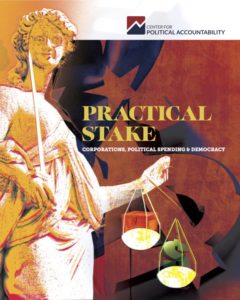First Hard Look at Business’ Stake in Democracy, How Their Corporate Political Spending Puts It All At Risk & How Companies Can Best Respond
In a new report, Practical Stake: Corporations, Political Spending and Democracy, released today, the Center for Political Accountability spotlights the risks that unaccountable corporate political spending poses to democracy – and thus to companies themselves, given their practical stake in a well-functioning democracy.
“When companies enable assaults on democracy through their political spending, they put their own futures at risk,” said CPA President Bruce Freed in summing up the report.
“Our report highlights these existential risks in today’s explosive political climate and offers companies a point-by-point framework for addressing the challenges,” Freed continued. “It will offer companies guidance as they try to navigate pressure to contribute political money in advance of critical midterm elections this fall and as they look ahead to the 2024 elections.”
CPA’s report examines case studies of millions of dollars in corporate donations to partisan groups that have engaged in assaults on democracy in Washington and in state capitals. It follows the money and the consequences and documents the dominant role of leading public companies and trade associations in giving to two such groups, the Republican Attorneys General Association and the Republican State Leadership Committee.
Chapter One follows the money trail to robocalls promoting the Jan. 6, 2021 march preceding the siege on the U.S. Capitol, and to litigation and voting to overturn the 2020 presidential election results. In state capitals, the money trail leads to election of officeholders who have backed new laws to restrict or suppress voting, and to races this year to control the once-nonpartisan machinery of state elections.
The report highlights the top spenders — 14 leading public companies and three top trade associations that contributed $39 million between the 2018 and 2022 election cycles to two 527 committees and two super PACs that enabled the attacks on democracy. The public companies accounted for $31 million, and trade associations $8 million.
Chapter Two argues that to thrive, companies need democratic processes that assure the rule of law, reflect the public’s will and punish political shakedowns. It details instead a growing climate of intimidation and threats against companies from politicians who disagree with them — a climate arising when democracy erodes. This is the case at the state level and has occurred at the federal level over the past four years.
Florida’s retaliation this month against Walt Disney Co., after Disney publicly criticized a controversial parental rights law, is a striking example of this climate. Gov. Ron DeSantis and the legislature revoked Disney’s long-held special tax district status for its Orlando-area theme park, a major employer in the state.
In Chapter Three, CPA provides a framework for companies to approach election-related spending in today’s volatile environment. The framework is the CPA-Wharton Zicklin Model Code of Conduct for Corporate Political Spending. It encourages companies to reevaluate goals and risks of their spending while aligning it with core company values and a commitment to democratic institutions.
The Center for Political Accountability is a non-partisan public policy organization. Its mission is to bring transparency and accountability to corporate political spending. This includes a framework for companies to approach and govern their spending.
For more information, visit www.PoliticalAccountability.net

